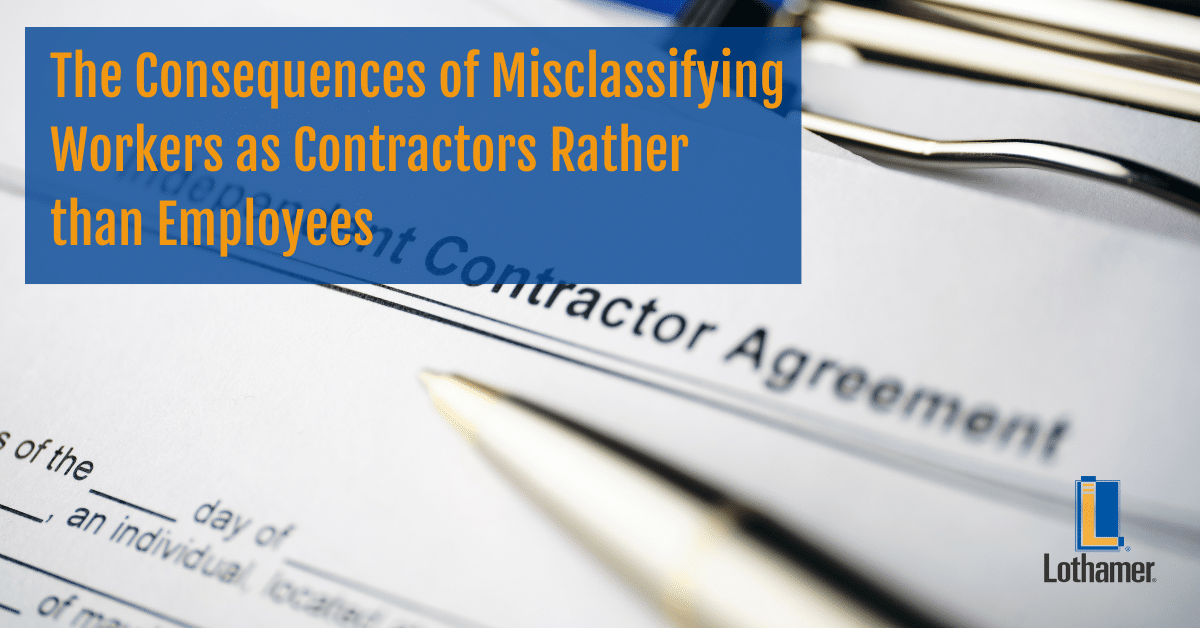
The IRS announced its Strategic Operating Plan for 2023–2031 this past April, which outlines its plans and vision for an IRS “transformation.” Part of this transformation includes “addressing noncompliance” and “using data and analytics to expand enforcement in certain segments.” For thousands of business owners in the Midwest, that translates to increased scrutiny in the years to come, especially when it comes to employee misclassification.
Lothamer Tax Resolution is already seeing an uptick in the number of business tax audits that involve misclassified workers. So, we wanted to take a moment to address this increasingly common tax issue and why it’s so important for business owners to get out ahead of it before the potentially devastating consequences roll in.
What is Employee Misclassification?
Employee misclassification refers to the practice of wrongly classifying workers as independent contractors rather than employees. Misclassification occurs when an employer incorrectly categorizes a worker’s employment status to avoid providing benefits, legal protections, workers’ compensation, and certain tax obligations associated with employees.
Worker misclassification is a form of tax evasion and a violation of employment law. An employee’s wages are subject to FICA taxes, including social security and Medicare taxes, and income tax withholding, which employers have to pay on their behalf. However, this isn’t required for independent contractors responsible for their state and federal taxes.
The IRS typically imposes a higher tax rate from employees than from contractors. Why? Because independent contractors can claim more deductions than employees when filing taxes, lowering their overall taxable income.
It makes cracking down on misclassification a lucrative source of revenue for the IRS. And advances in technology allow the IRS to quickly flag suspicious imbalances in income and expenditures. As a result, business owners paying workers under the table or treating employees as contractors must comply with IRS regulations to avoid penalties.
Definitions: Employee vs. Independent Contractor
The IRS uses a 20-factor test to determine whether a worker should be classified as an employee or an independent contractor. While there is no single factor that determines the classification, the IRS considers several aspects of the working relationship, including:
- Behavioral control: If the employer has the right to direct and control how the work is performed, including providing instructions, training, and setting specific work hours, it suggests an employer-employee relationship.
- Financial control: If the employer provides tools, equipment, and materials, or if the worker is reimbursed for expenses, it may be seen as a form of financial control. Independent contractors typically have their own business expenses.
- Relationship type: Employees typically receive benefits and work on a prolonged, rather than project-based, basis. Ongoing work could be a sign that the worker is an employee.
Some states, such as Indiana, use a version of this test called the ABC test to determine the status of workers. If you’re concerned about misclassification, address the issue head-on rather than wait until the IRS cites you for a violation.
Employee Misclassification Penalties
IRS penalties for misclassification can be severe. If an auditor determines that a worker has been misclassified, employers are typically liable for substantial back taxes and additional penalties.
First, pay the payroll taxes that you would have owed for that employee for the duration of your working relationship. Then, you may have to pay fines for misclassifying that worker, which could double your total tax burden.
Some employers also face legal consequences. Misclassified workers may file lawsuits seeking compensation for lost benefits and other damages. The Department of Labor (DOL) can also bring criminal charges against those seen as intentionally or flagrantly violating an employee’s federal protections, such as the right to minimum wage, under the Fair Labor Standards Act.
How to Avoid the Risk
Because misclassifying employees involves such major risks, prevention is key. Your Human Resources personnel should be highly informed of the criteria the IRS and state labor departments use to determine employee status.
We recommend that all businesses conduct a worker classification audit this year to ensure all working relationships are correctly classified. Make sure to maintain thorough and accurate records of all contracts, payments, invoices, and other relevant documentation to serve as evidence should questions arise. If in doubt, consult a tax professional for advice.
What to Do If You’re in a Tax Audit with Misclassified Workers
If you have been contacted by the IRS and find yourself facing an audit where misclassification may be an issue, call a licensed tax professional at Lothamer Tax Resolution right away. We can ensure that the process goes smoothly, preparing you for an audit and performing our own in-depth investigations. Knowing what to expect can help us reach a more favorable solution to the problem.
If you have misclassified your workers, you will have to meet your tax burden to correct the issue. That may involve paying any back taxes, benefits contributions, and additional penalties that are associated with the violation. However, our team of highly skilled tax professionals may be able to help you negotiate a more reasonable repayment plan that makes the difference between ruin and resolution.
Get Help from Lothamer Tax Resolution
The IRS is only getting more sophisticated in its pursuit of employee misclassification, unpaid payroll taxes, and other common tax problems that can land business owners in hot water fast. Lothamer Tax Resolution is here to support Midwestern businesses as they navigate the road to resolution and overcome their tax problems. If you think you may be facing a business audit or have already been contacted by the IRS, call our team today for immediate action.
IRS Tax Audit Help in Michigan, Illinois, Indiana, and Wisconsin
Lothamer Tax Resolution is the Midwest’s trusted source for help with business tax problems. Our team of Enrolled Agents is made of CPAs and tax professionals who are standing by to help business owners face the IRS and state tax authorities. We have the People + Technology to optimize your path to tax resolution, offering same-day tax help to our clients throughout the Midwest. Get unparalleled expertise, experience, and availability today by calling or texting (877) 955-9020 today or contacting us online.
"*" indicates required fields




